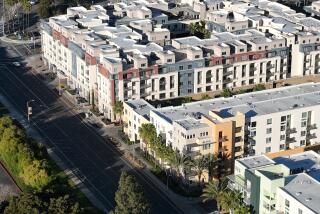Move-Up Home Buyers Pretty Much Left Out : Real estate: While Bush’s plan may boost first-time purchases, it does little to dispel caution in the other key housing sector.
Though regarded favorably by the real estate industry, President Bush’s proposals to stimulate home buying may do little to benefit housing’s long-suffering move-up market, particularly in Orange County and elsewhere in California, where high home prices and the adverse tax effects of Proposition 13 could keep potential buyers from trading up.
The President’s proposed financial aid package of a $5,000 tax credit for first-time buyers and a penalty-free individual retirement account withdrawal of up to $20,000 for a couple’s down payment is expected to boost first-time home buying. First-time buyers have been among the most active in the nation’s housing market through the recession, purchasing 45.1% of the 4.3 million housing units sold in 1991, according to a study released last week by Chicago Title & Trust Co.
But cautious move-up buyers, worried about corporate belt-tightening and layoffs, are wary of accumulating more debt. That may be especially true in California, where the median home price hovers around $200,000. The only incentive Bush offered move-up buyers is a tax deduction if they sell their home at a loss.
“High housing prices in California are a real issue for the move-up buyers because the types of incentives that the President talked about . . . represent relatively small portions of the purchase price,” said David Eisner, managing partner of Price Waterhouse Real Estate Group in Los Angeles.
“I do not think the message (Tuesday) by itself will give a strong stimulation to move-up buyers,” added Dick Loughlin, president of Century 21 Real Estate Corp. in Irvine. “The improved activity we’ve seen in January is, to a large degree, due to the drop in interest rates.”
Larry Webb, president of A-M Homes of Southern California in Newport Beach, said he was concerned that Bush’s plan was “just political rhetoric. Most of the solutions don’t relate to the high-priced parts of the Southland market. A $3,000 to $5,000 tax break won’t make the difference for a first-time home buyer in Orange County very often,” where the price is about $250,000.
Those now house-hunting face a quandary in timing their purchase in the wake of the Bush plan. If they wait until the plan is enacted, they may risk incurring somewhat higher mortgage payments because of the recent rise in interest rates. On the other hand, the proposals would save home buyers thousands of dollars up front.
“The tax credit for first-time buyers will give a psychological as well as financial boost,” said Bruce Akins, president of Akins Companies, an Irvine-based home builder, “and as first-time buyers get into the market, the move-up market also will get started.”
Experts have become concerned about possible increases in interest rates scuttling any positive impact from Bush’s plan. The national average for fixed-rate mortgages had risen to 8.84% Wednesday--after bottoming out at 8.31% earlier this month, according to HSH Associated, a Butler, N.J., publisher of mortgage information.
“The reason rates are heading up? It’s called the State of the Union,” said Paul Havemann, a vice president at HSH. The financial markets sense that some of Bush’s budget proposals “may be inflationary,” Havemann said. “There’s still a lot of single-digit mortgage money around. But for some people, the window (of opportunity) is closing.”
Experts have long considered a housing recovery crucial to the Administration’s efforts to jump-start the economy.
The sale, construction and remodeling of homes accounts for only about 3.5% of the annual $5.7-trillion total value of the nation’s goods and services, said Mark Lasky, a senior economist with DRI-McGraw Hill in Lexington, Mass. But because home sales stimulate a host of other consumer purchases--including appliances, furniture, carpeting and paint--the real estate industry may influence as much as one-fifth of the U.S. economy, experts say.
Already the beleaguered housing market has shown some signs of life as buyers have begun responding to the huge drop in interest rates since late December. Following Bush’s speech, the National Assn. of Home Builders boosted its 1992 forecast for new home sales to 790,000 from its previous prediction of 575,000 units.
More to Read
Inside the business of entertainment
The Wide Shot brings you news, analysis and insights on everything from streaming wars to production — and what it all means for the future.
You may occasionally receive promotional content from the Los Angeles Times.










